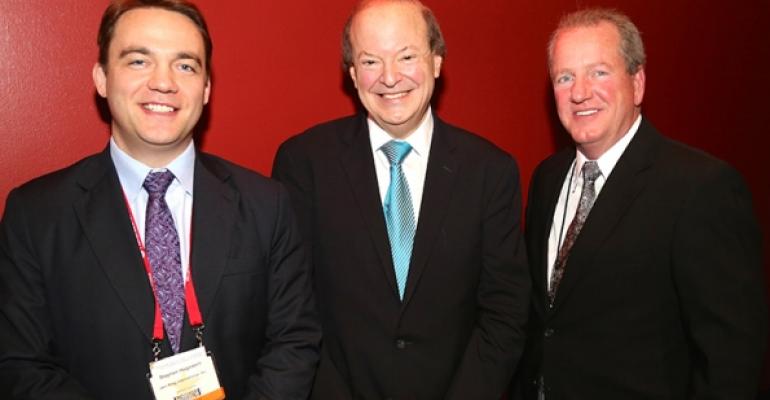The National Labor Relations Board’s controversial rulings on franchisors and their joint-employer status with franchisees have roiled the franchising industry, but a legal expert urged restaurateurs not to overreact.
“Please don’t panic,” advised David Kaufmann, senior partner at Kaufmann Gildin & Robbins LLP, at an International Franchise Association convention panel on Sunday in San Antonio that delved into the joint-employer developments.
“The bottom line is: You have to do what’s necessary to protect your brand image to the consuming public,” Kaufmann said. “That’s what brands are about: giving the public what they want and what they have come to expect from your brand.”
At the root of the unease is a December 2014 NLRB ruling that shifted the joint-employer status so franchisors might be held liable for employment actions by their franchisees, and subsequent NLRB actions that put practices at restaurant brands McDonald’s Corp. and Freshii in the crosshairs.
The board upheld the ruling in August 2015 in a case involving Houston-based waste-disposal company Browning-Ferris Industries and a union that had attempted to organize subcontracted workers at one of the firm’s recycling facilities. At issue was whether Browning-Ferris, as the contractor, could be forced to negotiate wages and benefits along with its subcontractor.
“It’s really going to disrupt an industry that has grown so much over the past 50 years,” Kauffman said of the NLRB rulings.
“This is impacting franchising now,” added Stephen Hagedorn, general counsel for Jani-King International Inc., at the IFA summit. “You see the McDonald’s case. You see the Freshii case. But that’s not all that’s going on. What you don’t see are the subpoenas that the Department of Labor is issuing. What you don’t see are the actions the Department of Labor is bringing against master franchisees.”
Additionally, some franchisors are seeing a chilling effect on interest among franchisees and potential franchisees.
“We are all conscious of people who are now deciding — or at least preaching to others — to change the way they are doing business because of the threat,” said John P. Murphy, vice president for law at Pizza Hut Inc., a division of Yum! Brands Inc. He added that franchisors are being cautious about what directives they make to protect the brand or what programs they put in place for fear that “it will be the one step too far in the NLRB-McDonald’s ruling.”
“You can’t let that control your business, because you are going to lose the value you have if you don’t do it the right way,” he said. “But it is affecting our ability to help franchise stores.”
In a separate interview, Aziz Hashim, the new IFA chairman and managing partner of Atlanta-based NRD Capital and its franchised KFC, Popeyes, Subway and Taco Bell brands, said the joint-employer rulings are a “total distortion of the franchise business model.”
“Joint employer creates a distortion by creating an agency that does not exist by saying that just because a franchisor provides support and services to a franchisee, they are somehow now co-employers,” Hashim said. “That’s ridiculous. The whole franchise business model is: I’m paying for support. I want ideas. I want your brand experience. That’s why franchising is less risky.”
Such regulatory rulings have a large impact, he added.

“It will change the way franchisors behave. It will change the way franchisees behave. It’ll change the reason to be a franchisee,” Hashim said. “We’re only buying the best practices and the licenses for the marks.”
Franchisors’ corporate field personnel do have to take care when they work in franchisee-owned units, Kaufmann said, but they also have to protect the brand without mandating any pay levels or actually scheduling of workers.
“People buy a franchise because they are looking to you for hiring [advice], how to staff, what kind of schedules make,” Kaufmann said. “That’s what franchisees look to franchisors for: They want guidance.”
And as part of his recommendations to franchisors, Kaufmann said they should not, in the face of the NLRB rulings, give up maintaining their brand standards.
“The bottom line is: You have to do what’s necessary to protect your brand image to the consuming public,” Kaufmann said. “That’s what brands are about: giving the public what they want and what they have come to expect from your brand.”
Contact Ron Ruggless at [email protected].
Follow him on Twitter: @RonRuggless

